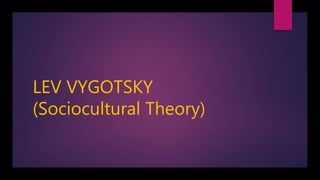
Lev vygotsky
- 2. Sociocultural theory grew from the work of seminal psychologist Lev Vygotsky, who believed that parents, caregivers, peers, and the culture at large were responsible for developing higher order functions.
- 5. The zone of proximal development, often abbreviated as ZPD, is the difference between what a learner can do without help and what he or she can do with help.
- 7. Vygotsky stated that a child follows an adult's example and gradually develops the ability to do certain tasks without help.[
- 8. Full development of the ZPD depends upon full social interaction.
- 9. There are two levels of attainment for the ZPD: Level 1 – the ‘present level of development’. This describes what the child is capable of doing without any help from others.
- 10. Level 2 – the ‘potential level of development’. This means what the child could potentially be capable of with help from other people or ‘teachers’.
- 11. Another important feature of this theory is scaffolding. When an adult provides support for a child, they will adjust the amount of help they give depending on their progress. For example, a child learning to walk might at first have both their hands held and pulled upwards.
- 13. As they learn to support their own weight, the mother might hold both their hands loosely. Then she might just hold one hand, then eventually nothing. This progression of different levels of help is scaffolding. It draws parallels from real scaffolding for buildings; it is used as a support for construction of new material and then removed once the building is complete
- 14. He believed that through help from other, more knowledgable people, the child can potentially gain knowledge already held by them. However, the knowledge must be appropriate for the child’s level of comprehension.
- 16. Anything that is too complicated for the child to learn that isn’t in their ZPD cannot be learnt at all until there is a shift in the ZPD. When a child does attain their potential, this shift occurs and the child can continue learning more complex, higher level material.
- 17. Implications for educators: Various investigations, using different approaches and research frameworks have proved collaborative learning to be effective in many kinds of settings and contexts. Teachers should assign tasks that students cannot do on their own, but which they can do with assistance; they should provide just enough assistance so that students learn to complete the tasks independently and then provide an environment that enables students to do harder tasks than would otherwise be possible. In the context of adults, peers should challenge each other in order to support collaboration and success.
- 18. As a final point, Vygotsky looked at the role of egocentric/private speech. This is, for example, when a child will sit on their own and speak their thoughts out loud as they play. He suggested a child is regulating and planning their behaviour at this point: “Where is the block? I can’t find it. Oh well, I’ll use this block.” He called these ‘monologues’.
- 19. By 7 years, these monologues become internalised and the child becomes a “verbal thinker”, which is what most adults can do with no problem. When we are faced with a problem, and we’re alone, we quite often think through the problem – but in our heads. Children before 7 will do this out loud. This verbal thinking forms the basis for higher level, more abstract thinking (planning, reasoning, memorising, evaluating).
- 20. Quick summary Emphasised the role of a teacher in cognitive development, and the need to have support from a More Knowledgable Other, or MKO. The zone of proximal development, or ZPD, differentiates between a learner’s current development and their potential development being taught from a MKO.
- 21. Scaffolding provides an effective way to reach potential levels of development, but only when different levels of assistance are given when required. Social and cultural tools are an important means of gaining intelligence. There is a close link between the acquisition of language and the development of thinking. Internalising monologues, and therefore becoming a verbal thinker, is a stepping stone to higher levels of thinking.
